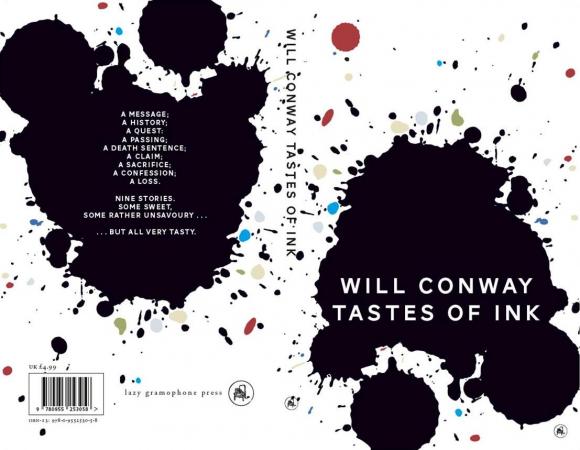 Tastes of Ink
Tastes of Ink
Will Conway
Lazy Grammophone. 2010. 130pp
£4.99
ISBN-13: 978-0-9552-530-5-8
The short story is the lighthouse of modern literature. The form has been used as a microscope into human relationships and world truths, as a social comment on the whats, wheres, hows and whys of the ways we have lived. Or, as in William Conway’s Tastes of Ink, the short story form exists as not-so-traditional yarns that seek to challenge their own minimalist existance. Welcome to the 21st century. We witness the inward turning of the modern short story. Contemporary writers are shattering their predetermined ‘Author-as-Truth-Seer’ position. A severe humanist finger is no longer pointing with disgust at the reader. No, modern writers seek deconstructive narratives: the words exists on the white page but the reader’s interpretation becomes the sole creator of the story.
Tastes of Ink is part of this new trend of writing where short stories form self-contained capsules of narrative but the question still remains, ‘what does all this mean?’ The collection is loosely held together by Lazy Gramophone’s tag: ‘life, death and everything in between.’ Nevertheless, the absence of literary cohesion is well suited; the result is a literal splatter of development and dialogue. Stories become inkblots; no one reader’s interpretation will ever be the same. In fact, Tastes of Ink defies expectation. Some stories like News and Visitors set determined development arcs, only devolve them as the story progresses. Yet more impresive is the way the words exist beautifully on paper without necessarily understanding – or lending to – their own context. As an experimental writer myself, I’m fascinated by how Conway has managed to maintain the character arc and structure without the narrative simply imploding since the stories have no defined linkages between them. The answer must lie squarely at the reader’s feet. As a composer, Conway has written virtuoso on his music sheet yet it is the reader who creates the performance through the act of…well…reading. The leap from story to story is something that one must create mentally. However I suspect that the strength of the collection lies in the variety of the stories and their humourous executions. You want aliens and toilet musings? Better believe it, Tastes of Ink has it locked down and bundled. The diversity of the collection makes the stories perfect for a lazy Sunday afternoon.
Consequently, the stories themselves are light enough for the reader to enjoy in a single sitting and long enough for the cut-throat narrative to read beyond the page. It is the experience of ‘reading beyond the page’ that is key for the successful short form. True to the nature of ink, each story has a metaphorical bleed where the inherent super objective of the narrative isn’t always clear. Yet upon the story’s conclusion, the reader-response is to engage multiple reviews of the text in order to unravel the mystery intent of the story. Or to put it plainly for the layperson, one simply wants to keep on reading. The text is simple but not skeletal, sometimes disturbing without the shock appeal. If I didn’t know better, I suspect the stories News and Potty Mouth demand a vocalised reading; the laid back language is certainly refreshing. I hope Conway is exploring this avenue. I would certainly pay to see a reading.
Depending on how you want to look at the collection, William Conway is either the new darling of the short story form or its delightful villain. My response will be keep a watchful eye on this talented emerging writer: he might smile softly but he’ll steal your dog when you’re not looking.